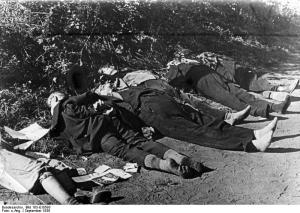 Mainstream historians implicitly create an impression that Nazi Germany was the only nation that committed war crimes and crimes against humanity during the WW2 in Europe (and Japan – in the Far East, correspondingly).
Mainstream historians implicitly create an impression that Nazi Germany was the only nation that committed war crimes and crimes against humanity during the WW2 in Europe (and Japan – in the Far East, correspondingly).
Implicitly because this is simply not true. In reality, all major powers (and even minor, of you add the immediate aftermath of the war into equation) committed horrible war crimes and crimes against humanity during the war. It is a well-established and totally indisputable historical fact that I will cover in detail in one of my future posts.
Interestingly enough, Nazi Germany was not even the first belligerent country to commit a war crime. The first war crime of WW2 was committed… by Poland on September 3rd 1939 – two days after Nazi Germany invaded that nation and right on the very same day when Britain and France declared war of Germany (thus transforming a very much manageable local conflict between neighboring nations into a full-scale Great War). The Second World War.
This war crime came to be called the Bromberger Blutsonntag (‘Bloody Sunday in Bromberg’). As it is typical in almost all such incidents, an account of what actually happened depends heavily on ‘who is writing’. Hence, German and Polish versions of events are… well, different.
Given the general situation of the first days of this brief German-Polish war, the most probable version is something like this. In the morning of September 3rd the contingent of the Polish Army was withdrawing through Bromberg (currently Polish city of Bydgoszcz) and was attacked by German commandos (operating behind the enemy lines) supported by some armed German citizens of the city (the ‘insurgents’, if you will).
There was an exchange of gunfire which resulted in some heavy Polish losses and in a complete extermination of their German opponents. When the Polish soldiers (and officers) and some local Polish citizens discovered that they have been fired upon by their ‘good German neighbors’, they got so outraged that they massacred all German citizens of the city they could lay their hands on.
The death toll, according to different sources, was anywhere from around 100 (Polish estimates) to over 1,700 (German estimates). The latter, however, includes the number of Germans who died during the subsequent so-called ‘death marches’.
Unfortunately, the Poles did not stop there. They continued wholesale killings of their ‘good German neighbors’ and by the end of the German-Polish war, murdered about 5,000, according to American historian Alfred-Maurice de Zayas – probably the leading expert on war crimes against Germans and their allies.
Not surprisingly, German reprisals were horrendous. Right after taking Bromberg and discovering war crimes committed by Poles, German military units of the Einsatzgruppen, Waffen SS, and Wehrmacht executed between 200 and 400 Poles practically ‘on the spot’.
Interestingly enough, there was an actual investigation of the events by German military authorities – and even a formal, official trial. According to German historian Christian Raitz von Frentz, 876 Poles were tried by German military tribunal for their alleged involvement in the events of Bloody Sunday before the end of 1939. 87 men and 13 women were sentenced to death without the right to appeal and promptly executed. Whether they were actually guilty, is a very big question, but there is evidence that German military tribunals (unlike the Soviet ones) at least tried to conduct fair trials.
All in all, it is estimated that more than 20,000 Polish citizens of Bydgoszcz (14% of the population) were either executed or died in concentration camps during the occupation. The Bromberger Blutsonntag, not surprisingly, heavily influenced the whole German program for the so-called ‘pacification’ of Poland (Nazis were always really big on vengeance) which resulted in the death toll of over 800,000 (!) Poles.
It did not cause this program, of course (Nazis had been planning mass murders of Polish nationals as early as in Spring of 1939), but it did influence it. It is highly probable that without the ‘Bloody Sunday’ and subsequent mass murders of Germans in Poland, the number of casualties of German reprisals would have been much lower.